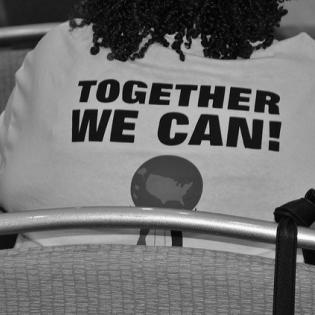Resolving Conflict with Respect HS
The United States is a culturally pluralistic nation, meaning it is comprised of smaller groups within the larger society. These groups maintain their cultural identities, values and practices within the larger construct of the laws and values of the wider society. Although this is the strength of the U.S., it has produced conflicts in our history and today. Conflict is not inevitable and knowing the proper means to communicate and resolve issues can mitigate many problems. This lesson will entail students evaluating the roots of conflicts and methods on how to resolve conflict with respect.
Students will be able to….
- identify conflicts that have persisted in history and those we are facing today.
- evaluate their own perceptions in relation to contentious issues.
- learn methods on how to resolve conflicts.
PowerPoint (handout below)
Look up the Riddle Scale on the Internet to prepare for a discussion
Instructions
Anticipatory Set:
- Brainstorm with the students what conflicts are taking place today in the world, school, or in the students' lives. The teacher or a student may compile these upon the board.
- Place the student’s response into different scales: Personal, Local/School, National, International.
- Pose the question: What are the roots of all conflicts? Discuss ideas as a class.
Read about the Riddle Scale (easily found on the Internet). Explain the eight levels of how one can perceive others. Discuss the value of self-evaluation of how we feel about different people. It may be used to evaluate how we feel, raise awareness, and change attitudes. An example includes how we feel when a baby cries on an airplane. It may cause us to feel pity, repulsion, or admiration (of the way the parents handle it). Our feelings may be balanced by tolerance, and we change our attitude out of awareness. Can the scale be used to raise awareness of an issue in the community related to how people are using a public space or people from a different background? Discuss.
Have students privately take the survey of how they perceive certain groups of people. You may alter the categories based on circumstances at your school. These should be completed for self-reflective purposes only, in order to put the ideas in a personal context for better understanding.
Go through the PowerPoint (attached below), giving a lecture on the different methods of resolving conflicts.
Have students engage in acting out hypothetical conflicts. This can be done as a class or in pairs, or with the teacher.
Service Project: Work together to make a conflict resolution protocol to share with the rest of the student body. Groups can research procedure, test a strategy, and decide the best way to teach and share their methodology around campus.
Have students write a reflective piece where they answer the following and turn in to the teacher:
What are the roots of conflict and what did I learn about myself today on how I perceive other groups? What methods are there to alleviate conflict?
Handouts
Philanthropy Framework
-
Strand PHIL.II Philanthropy and Civil Society
-
Standard PCS 01. Self, citizenship, and society
-
Benchmark HS.3 Give examples of human interdependence and explain why group formation is one strategy for survival.
-
Benchmark HS.4 Describe and give examples of characteristics of someone who helps others.
-
-
Standard PCS 02. Diverse Cultures
-
Benchmark HS.2 Give examples from history of how intolerance of ideas, religion, and minorities contributed to social disintegration.
-
-
Standard PCS 07. Skills of Civic Engagement
-
Benchmark HS.1 Utilize the persuasive power of written or oral communication as an instrument of change in the community, nation or the world.
-
Benchmark HS.4 Analyze and synthesize information to differentiate fact from opinion based on the investigation of issues related to public policy. Discuss these issues evaluating the effects of individual actions on other people, the rule of law and ethical behavior.
-
-
-
Strand PHIL.IV Volunteering and Service
-
Standard VS 01. Needs Assessment
-
Benchmark HS.2 Research the need in the school, neighborhood, local community, state, nation, or world.
-
-
Standard VS 03. Providing Service
-
Benchmark HS.6 Describe the procedures and the importance of sensitivity to the people with whom students are working.
-
-
